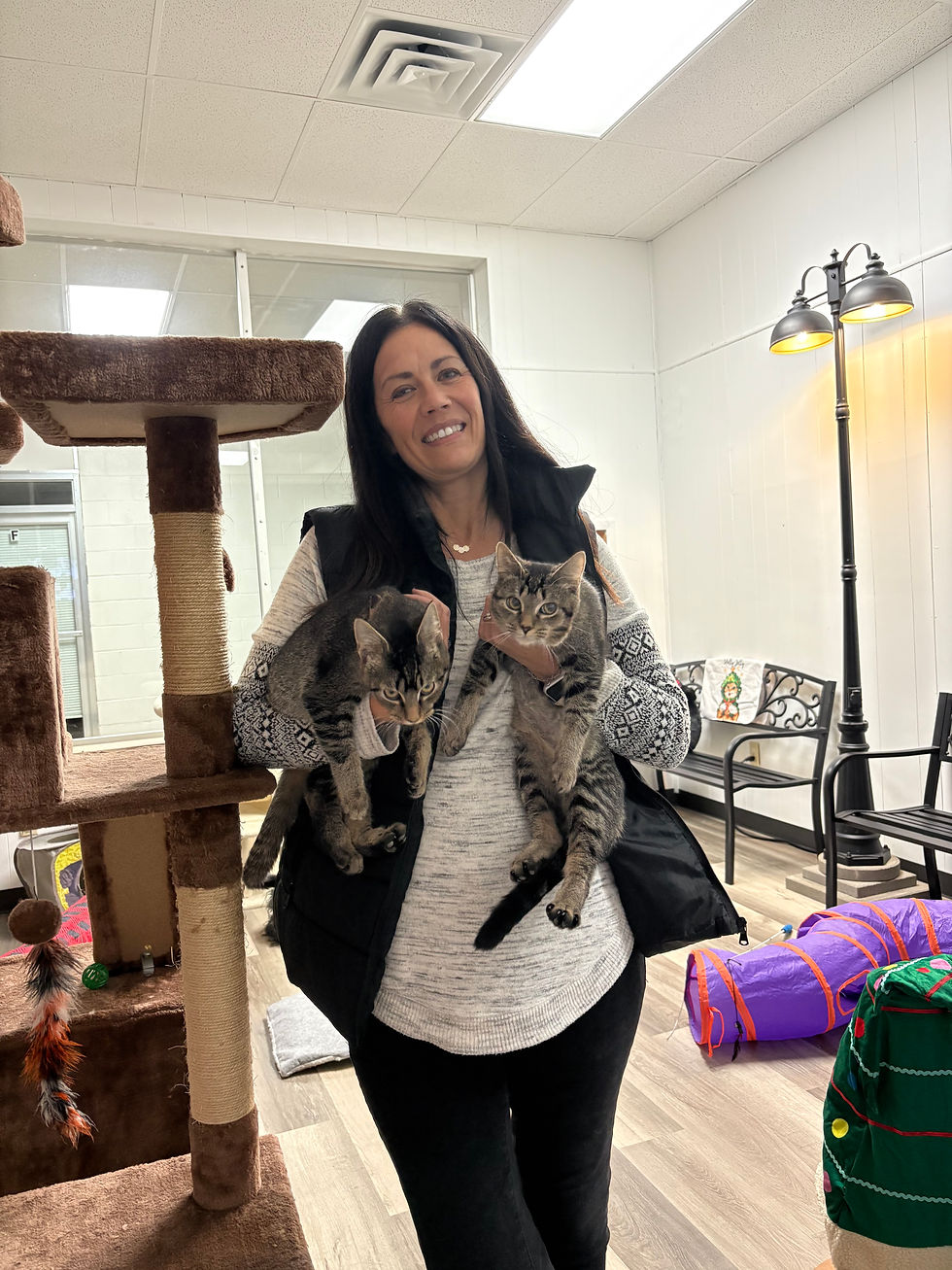Volunteer Spotlight: Leah Bewley
- Alexandria Allender

- Feb 7, 2025
- 3 min read

Leah Bewley is a fantastic volunteer who has assisted PAWS in a variety of ways since October 2013 when she began volunteering. She started volunteering with P.A.W.S. because she went to look for a kitten, which unfortunately had already been adopted. Nancy, the founder of P.A.W.S, was caring for kittens at her house and brought the kittens for Leah to see, allowing Leah to visit the P.A.W.S. center. Leah fell in love with P.A.W.S. while she was there, and decided to start volunteering.

Leah has always grown up with animals, and was known for bringing home strays as a kid. Eventually, she went on to work at the Indianapolis Zoo as a zookeeper, and worked with a variety of animals, including dolphins, polar bears, and a little bit of everything that the Indianapolis Zoo has to offer. While she doesn’t work at the zoo now, she’s continued working in the animal field by keeping a part-time job at Silly Safaris. They specialize in conservation-inspired live animal shows.
Leah is primarily a bunny foster for PAWS, and our best guess is that she has fostered over twenty rabbits for PAWS. A typical day in caring for rabbits includes feeding them breakfast, changing their litterbox, providing fresh water, straightening their enclosure, socializing them, and providing proper enrichment. Leah is passionate about all that P.A.W.S. does, from taking in unwanted animals, to providing medical care, to adopting them into loving families. She focuses primarily on rabbits since they work well around her current schedule.

Leah hasn’t just focused on rabbits though. In the past, she’s cared for preemie kittens.
They stuck out to her due to how fragile they are, and how much care they need. When asked about her biggest challenge she’s faced while volunteering, Leah goes back to the kittens. Not all of them made it unfortunately, due to weak or underdeveloped bodies and immune systems. There was one preemie kitten who made it, named Lincoln. It was a challenge to care for him, but when he thrived, Leah was ecstatic. One of her regrets is that she didn’t keep him for herself.

Volunteering with P.A.W.S. has had a massive impact on Leah’s life by giving her an opportunity to nurture animals in need and give back to her community. One of the rabbits she fostered, Jessica Rabbit, is one animal that comes to mind. Jessica was territorial and was biting people at Greenfield Hancock Animal Management, but warmed up due to Leah’s understanding. This allowed Leah to see the impact of her nurturing.
Since starting with P.A.W.S. , Leah has learned a lot. She’s learned about our rescue and others, and how to form a game plan by watching other rescues and seeing where they succeeded. Another great resource that taught her a lot about rabbits was YouTube and the multitude of videos found there. She’s learned as well that she enjoys fostering for P.A.W.S, and while breaks are nice, she misses the rabbits on occasion.

Leah would offer this advice to people wanting to help rescue animals: “They deserve the
best from us. It’s like with kids. They deserve that care and that attention to meet their needs. Make sure it’s a passion. Just because you like kids doesn’t mean you’d be a good teacher. And animals require a lot. You have to be a little self-sacrificing.” When the hard days do happen, Leah stays motivated and positive by letting go of perfectionist thoughts and staying present. She also practices self care to stay present and let go of unrealistic expectations.
Skills like being personable and friendly with potential adopters or those asking questions can be incredibly helpful in this field of work, according to Leah. Being caring, responsible, and attentive to an animal's health and needs is also important, especially when fostering.
Leah wishes to continue helping with P.A.W.S, one animal at a time. She wishes for the community to see P.A.W.S. as a resource for taking in animals, for education on animal care practices, and a safe place for people to share their needs, like what we offer with the food pantry.
Leah is aware that we cannot possibly save them all, but we can absolutely make a difference for animals, one animal at a time.




Comments